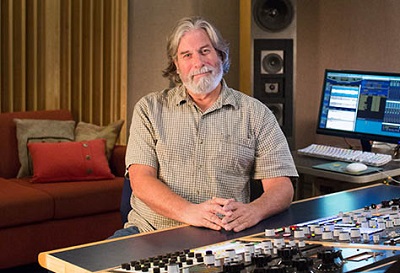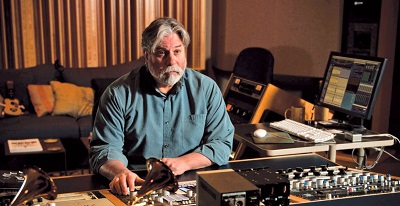
"Chief Engineer" David Glasser Interview
AirshowMastering.com
Interview by Roger Zee (03/02/21)
Roger Zee: I remember meeting you, Tim, and Mark in 1971 during our freshman year at Brandeis University -- all big Dead Heads! You and I worked together at the college radio station, WBRS-FM.
David Glasser: I think I spent most of my time at the radio station -- and my grades proved it! I started as a DJ and eventually moved on to Program Director, though in retrospect, I really had no idea what to do. Those college years -- all about the music. Such a great time and community for experiencing all different kinds of music.
RZ: What inspired you to get into audio engineering and record mastering?
DG: Always a huge music fan as well as interested in technology and gadgets. Audio engineering, where those two intersect! Thatís why I got involved in the college radio station. After graduation, I took a job at the commercial radio station down the street from Brandeis, and that led to an engineering position at National Public Radio in Washington, DC.
RZ: Talk about some of the places you worked along the way.
DG: NPR, a great place for me to work in the 80ís with most of the thirty or so young studio engineers eager to learn and experiment. Not crazy about working on the news shows. I always wanted to get involved in music or interesting post-production. I ended up working a lot of remote recording including Classical music -- from chamber music and choirs to symphony orchestras at the Kennedy Center. The Jazz remotes proved the most fun and challenging. I worked on recording all sorts of Jazz in clubs to concert halls in NY, DC, LA, and San Francisco. The most memorable, a concert featuring The Modern Jazz Quartet, Ray Brown Trio, and Joe Sample with the New American Orchestra at the Dorothy Chandler Pavilion in LA. Like many of those kinds of gigs, I worked out of one of the Record Plant remote trucks.
After leaving NPR, one too many bullshit news conferences to record, I started my company Airshow to provide remote recording and broadcast services. We started a great gig that time recording and broadcasting live the Paul Winter Consort Winter Solstice Celebration at the Cathedral of St. John the Divine in NYC. An annual show, I worked it for around ten years! Lucky and thrilled also to record a series of radio shows by my comedy heroes, the great Bob and Ray!
The remote recording morphed into mastering, using one of the early Digidesign digital workstations. I built a mastering studio in northern Virginia and ended up mastering a lot of terrific bluegrass music, as well as local Rock and Jazz projects. When we outgrew the studio space, I opted to move to Boulder, CO where we built a multi-room mastering facility.
RZ: Talk about the new facility, Airshow Mastering, in Boulder.
DG: In 2016 I downsized the company from five engineers and a studio manager to just two engineers. Then we built a new studio on my property in the foothills west of Boulder, CO. A great, quiet location with awesome views. Nice and quiet. This allowed me to concentrate on my craft and not get too bogged down with managing a staff -- something I find very draining and soul-killing. They nominated the new studio for a TEC Award in 2017.
RZ: Tell me about working with the Grateful Dead and other Grammy winning projects.
DG: In 2003, we built a new surround-capable mastering studio at the Boulder facility. The studio designer, Sam Berkow, did a lot of acoustics work for the Grateful Dead and introduced me to Don Pearson, the Deadís legendary sound system operator. Pearson liked what he heard at the studio and introduced me to Jeffrey Norman, the Deadís mixing and mastering engineer. Norman booked time to master the "Grateful Dead Movie" in surround for a DVD release. Since then, I mastered many Grateful Dead projects. Itís really a dream gig, some of my favorite music. And the production team at Rhino's terrific to work with. Last year, I mastered the 50th anniversary editions of "Workingmanís Dead" and "American Beauty" -- for me, two of the greatest albums ever recorded in any genre.
So fortunate to work with a lot of talented musicians. I mastered around 100 Grammy-nominated records -- about twenty Grammy-winners. Nominated three times and won two Grammys in the Historical Album category for work on "The Anthology of American Folk Music," and "Screaminí and Holleriní the Blues: The Worlds of Charlie Patton." I really love working on those deep roots that laid the foundation for all the music we listen to today.
RZ: How's the Pandemic affected you? What's on your horizon?
DG: It affected me less than many in the music business. Even before the pandemic, our clients did not attend the majority of my sessions. Gratifying that folks still released music this past year, but I know things slowed down. And if venues donít start opening up, the fallout in the music business will become tragic.
RZ: Describe your most special and/or most unusual gig.
DG: Unusual: before I got into the mastering racket, I worked broadcast and remote recording. In the mid-80's, a producer friend asked me to design and build a mobile production rig for a company that wanted to broadcast live audio coverage of PGA tournaments to crowds on the golf courses. This called for wireless -- not something easy to do back then. But it took me all over to golf tournaments in Pebble Beach, Dallas, Florida, Arizona, and more.
Special: mastering the "Grateful Dead Movie" for DVD release. My first Grateful Dead gig, and it changed everything!
RZ: How do you see the future of the music business?
DG: Hard to say. People will always create music. But making a living's another matter. The capitalists running streaming services like Spotify really devalued music and music makers.
RZ: What advice do you give up-and-coming sound engineers?
DG: Be curious. Donít be afraid to fail. Donít believe anything on social media. Never say no to a gig. Study your ass off. Learn Filemaker. Know how to align a tape machine, even if youíll never use one. Be humble.
RZ: Do you live with any animals?
DG: Dog! Iíve lived with a doggie companion for almost 50 years, just not the same dog. Couldnít and wouldnít live without one. Lola the Weimeraner.
YouTube - Opening Sequence/U.S. Blues - Grateful Dead Movie
©2021 Roger Zee


